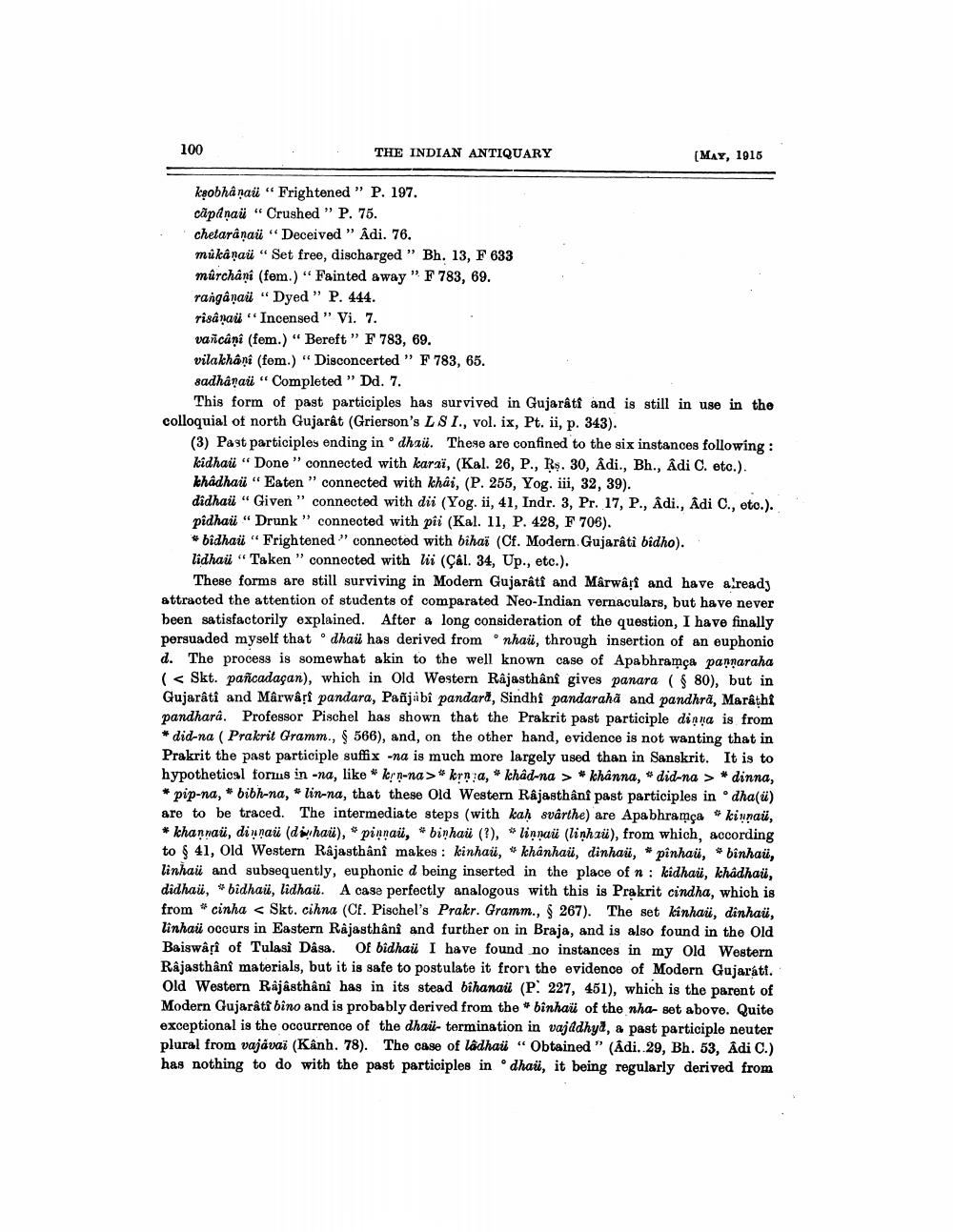________________
100
THE INDIAN ANTIQUARY
ksobhanaü"Frightened" P. 197. capaṇai "Crushed " P. 75. chetarânai "Deceived" Adi. 76.
mükâṇaü "Set free, discharged " Bh. 13, F 633 mûrchânî (fem.) "Fainted away " F 783, 69. rangânai "Dyed" P. 444.
risânai Incensed " Vi. 7.
[MAY, 1915
vañcânî (fem.) " Bereft" F 783, 69.
vilakhani (fem.) "Disconcerted" F 783, 65.
sadhanai "Completed " Dd. 7.
This form of past participles has survived in Gujarâtf and is still in use in the colloquial of north Gujarât (Grierson's LS I., vol. ix, Pt. ii, p. 343).
0
(3) Past participles ending in dhai. These are confined to the six instances following: kidhai "Done" connected with karai, (Kal. 26, P., Rs. 30, Adi., Bh., Adi C. etc.).
khâdhai "Eaten " connected with khâi, (P. 255, Yog. iii, 32, 39).
didhai "Given" connected with dii (Yog. ii, 41, Indr. 3, Pr. 17, P., Adi., Adi C., etc.)..
pidhai "Drunk" connected with pii (Kal. 11, P. 428, F 706).
*bidhai "Frightened" connected with bihaï (Cf. Modern. Gujarâti bidho).
lidhai "Taken" connected with lii (Çâl. 34, Up., etc.).
*
*
*
These forms are still surviving in Modern Gujarâtî and Mârwârf and have already attracted the attention of students of comparated Neo-Indian vernaculars, but have never been satisfactorily explained. After a long consideration of the question, I have finally persuaded myself that dhau has derived from nhau, through insertion of an euphonic d. The process is somewhat akin to the well known case of Apabhramça panṇaraha (< Skt. pañcadaçan), which in Old Western Rajasthânî gives panara (§ 80), but in Gujarati and Mârwârî pandara, Pañjabî pandard, Sindhi pandaraha and pandhra, Marathi pandhara. Professor Pischel has shown that the Prakrit past participle dinna is from *did-na (Prakrit Gramm., § 566), and, on the other hand, evidence is not wanting that in Prakrit the past participle suffix -na is much more largely used than in Sanskrit. It is to hypothetical forms in -na, like krn-na> krna, khâd-na > khânna, did-na > * dinna, *pip-na, bibh-na, * lin-na, that these Old Western Rajasthânî past participles in dha(ü) are to be traced. The intermediate steps (with kaḥ svârthe) are Apabhramça kinnaü, * khannaü, dinnaü (dihai), pinnaü, binhai (?), linnaü (linhai), from which, according to § 41, Old Western Râjasthânî makes: kinhau, khânhaü, dinhai, pînhau, bînhau, linhai and subsequently, euphonic d being inserted in the place of n: kidhai, khâdhai, didhai, bidhai, lidhaü. A case perfectly analogous with this is Prakrit cindha, which is fromcinha Skt. cihna (Cf. Pischel's Prakr. Gramm., § 267). The set kinhai, dinhai, linhai occurs in Eastern Rajasthânî and further on in Braja, and is also found in the Old Baiswari of Tulasi Dâsa. Of bidhai I have found no instances in my Old Western Rajasthânî materials, but it is safe to postulate it fror the evidence of Modern Gujarati. Old Western Rajasthânî has in its stead bihanai (P. 227, 451), which is the parent of Modern Gujarati bino and is probably derived from the * binhaï of the nha- set above. Quite exceptional is the occurrence of the dhai- termination in vajadhya, a past participle neuter plural from vajavai (Kânh. 78). The case of ladhai "Obtained" (Adi..29, Bh. 53, Adi C.) has nothing to do with the past participles in dhau, it being regularly derived from
*
*




